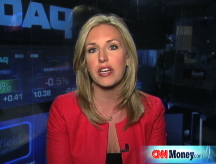Oil spikes, stocks tank
Crude prices top $123 a barrel, dragging on equity prices as investors step back after a strong April and start to May.
NEW YORK (CNNMoney.com) -- Stocks slumped Wednesday, with the Dow losing over 200 points, as oil prices crossed the $123 a barrel mark, giving investors a reason to pull back after the recent rally.
Oil prices settled at a record $123.53 a barrel, sparking worries about how higher commodity prices might hurt consumers in an already weak economy.
The Dow Jones industrial average (INDU) lost 206 points, or 1.6%, while the broader Standard & Poor's 500 (SPX) index tumbled 1.8% and the Nasdaq composite (COMP) also gave up 1.8%.
Investors have taken ever-climbing oil prices in stride for weeks, instead focusing on signs that the economy is starting to stabilize and the worst of the credit crisis is over. That perspective has propelled stocks, with the major gauges jumping as much as 15% off the March lows through early May.
But after such a run, market participants were perhaps looking for a reason to step back - and the latest oil record provided that impetus.
"You have people doubting that the rally is the real deal, that it has any legs, combined with a volatile situation in oil, and people stepped back," said Chris Johnson, CEO and CIO at Johnson Research Group.
The stock market will probably stick to a trading range over the next few months as investors look for more evidence that the worst is over, said Matt King, chief investment officer at Bell Investment Advisors.
"We got a little break with the first-quarter GDP report, but there are still questions about the economy and whether we are in a recession," he said.
Thursday brings reports on March wholesale inventories and the weekly jobless claims. There are no market-moving earnings due in the morning.
Inflation worries abound: U.S. light crude oil for June delivery settled at a record $123.53 a barrel on the New York Mercantile Exchange, after hitting a trading high of $123.75 a barrel earlier. Prices had been volatile after the weekly inventories report showed a surprise rise in both crude and gas supplies.
Oil hit record settlement and trading highs Tuesday after a Goldman Sachs analyst said crude prices could reach $150 to $200 within the next six months to two years.
Morning economic reports showed further weakness in housing and some strength in worker productivity. The productivity report's inflation component eased, but with record oil and gas prices, worries about pricing pressure remain a drag.
Adding fuel to the fire was an afternoon report showing that consumer credit jumped a much bigger-than-expected $15.3 billion versus the $6 billion forecast.
Company news: Financial stocks were among the day's big losers, with Dow components AIG (AIG, Fortune 500), American Express (AXP, Fortune 500), Bank of America (BAC, Fortune 500), Citigroup (C, Fortune 500) and JP Morgan Chase (JPM, Fortune 500) all declining.
But the selloff was broad-based, with 24 out of the Dow 30 components falling and 93 of the Nasdaq 100 sliding.
Apple (AAPL, Fortune 500), Oracle (ORCL, Fortune 500) and Qualcomm (QCOM, Fortune 500) were among the big tech losers.
In other news, Clearwire (CLWR) and Sprint Nextel (S, Fortune 500) are combining their wireless units to create a new company called Clearwire.
The $14.55 billion deal is backed by Intel (INTC, Fortune 500), Google (GOOG, Fortune 500), Comcast (CMCSA, Fortune 500), Time Warner Cable (TWX, Fortune 500) and Bright House Networks, and will give the companies a stake in the new venture.
The news was especially notable after several high-profile deals have been cancelled or thrown into question of late, including the proposed Microsoft (MSFT, Fortune 500) purchase of Yahoo (YHOO, Fortune 500), and Bank of America (BAC, Fortune 500)'s buy of Countrywide Financial (CFC, Fortune 500).
Market breadth was negative. On the New York Stock Exchange, losers beat winners by seven to three on volume of 1.28 billion shares. On the Nasdaq, decliners beat advancers by five to two to one on volume of 2.29 billion shares.
Eye on earnings: A standout to the upside was Dow component Walt Disney (DIS, Fortune 500), which gained 2.9% after it reported higher quarterly earnings that topped estimates, thanks partly to results at its theme parks. The late Tuesday news sent the stock higher Wednesday.
Cisco Systems (CSCO, Fortune 500) reported quarterly sales and earnings late Tuesday that topped forecasts. However, the network gear maker's current-quarter revenue forecast was more conservative than what some analysts had been expecting and the stock lost 2% Wednesday.
ON Semiconductor (ONNN) rallied over 20% in unusually active Nasdaq trading, after forecasting second-quarter sales that are beyond analysts' forecasts. The company also reported first-quarter earnings that topped estimates on revenue that missed estimates.
First-quarter earnings outside the financial sector have been mostly positive, with tech and other areas showing some strength. But a plunge in financial sector profits amid the fallout in the credit markets has left overall earnings on track to have fallen more than 16% from a year ago.
Still, signs that the economy has turned a corner, or soon will, have reassured investors of late, as have indications that the worst of the financial market mess may be over.
Economic news: The Pending home sales index, a measure of the number of homes under contract to sell, dipped 1% in March, according to an industry report released Wednesday. The decline was in line with expectations.
Worker productivity rose at a better-than-expected 2.2% annual rate in the first quarter, the government reported Wednesday. Unit labor costs, the report's inflation component, slowed to an annual rate of 2.2% from 2.8% in the fourth quarter of 2007.
Other markets: COMEX gold for June delivery fell $6.7 to settle at $8.71 an ounce.
The national average price for a gallon of regular unleaded gas rose to $3.618 from $3.610 the previous day, according to AAA.
The dollar rose versus the euro and slipped against the yen.
Treasury prices rallied, lowering the yield on the benchmark 10-year note to 3.84% from 3.92%. Bond prices and yields move in opposite directions. ![]()




